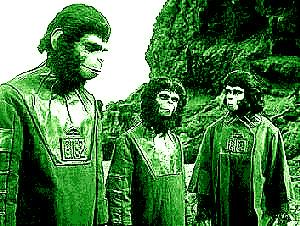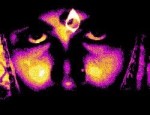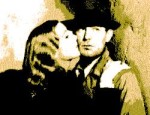Film Review
As well as being one of the most popular science-fiction films of the
1960s,
Planet of the Apes is
also one of the most important. It ushered in a new kind of
realistic sci-fi movie, laying the foundation for today's blockbuster
fantasy adventure films. It offers not only a well-crafted
rendition of an exciting story, it also serves as a potent allegory of
man's cruelty to other species and to his own kind. This is a
potent morality tale dressed up as hugely entertaining piece of film
escapism, one that makes you see the world in a new light and might
even change the way you live.
Based on the French-language novel
La
Planète des singes by Pierre Boulle, the film shows us a
fantastic yet chillingly plausible version of the future in which man
is no longer the dominant species in his world. The film was such
a hit that it was followed by four sequels and two television series
(one animated, the other live action), all of which enjoyed similar
success. Before the
Star Wars juggernaut came
along,
Planet of the Apes was
the most heavily merchandised sci-fi film ever. Fans were able to
fill their homes (or ape caves) with a plethora of goodies relating to
the film: books, comics, toys, action figures, games and, best of all,
the Halloween masks. In spite of its dodgy 2001 remake, the film
is still highly regarded today and it entirely justifies its status as
a cult classic of its genre.
The main factor behind the success of the original
Planet of the Apes film was the
adept realisation of an advanced simian race, which is primarily down
to John Chambers' groundbreaking prosthetic makeup. The latex ape
mask that Chambers perfected (and which won him an honorary Oscar) had
first appeared in an episode of the sci-fi TV series
Lost in Space. It is so
flexible that the actor wearing it is able to show a wide range of
facial expressions and so make it come alive. The apes range from
the gentle, inquiring chimps to the proud orang-utans and the
belligerent gorillas - all are convincingly portrayed and all have a
nobility about them. Not for a moment do you see them as men in a
mask.
It helped that behind the ape masks were some very talented actors who
were able to make their characters every bit as realistic and complex
as the human protagonists. Roddy McDowall and Kim Hunter are
especially memorable as the sympathetic chimpanzee scientists Cornelius
and Zira. McDowall is the actor most associated with the
Planet of the Apes franchise; he
appeared in all of the films and also in the popular 1974 television
series. He is a rare example of an actor who is best known for
playing a part in which his own face is not visible to the audience.
Of course, there is far more to this film than good
make-up. It is intelligently scripted, well-directed and
imaginatively photographed. The interior sets immediately suggest
an advanced civilisation that is far removed from our own, whilst the
exteriors (particularly those shot in the Grand Canyon) really do
transport us to an other world. Jerry Goldsmith's eerie
modernist music adds to the unsettling otherworldly mood of the film,
itself sounding like the product of another civilisation.
Whilst the later films in the series veered towards whimsy and
self-parody, this first outing offers a dark and disturbing viewer
experience, and not just because of its graphic violence and hard-edged
realism. The main reason why this film is so shocking is because
the world it depicts is so frighteningly like our own. It depicts
racial division, suppression of truth by political leaders,
exploitation of power by those who are there to enforce law and order,
and unpardonable ill-treatment of the lesser species. This is a
film that holds up a mirror to our own perverse reality, and
becomes more meaningful, more disturbing the more times you watch
it.
And as if that was not enough,
Planet
of the Apes has one of the most iconic sequences in cinema
history - the final scene in which Charlton Heston realises what has
happened to his world. Realised with a devastating
simplicity that is both lyrical and shocking, the final shot leaves a
lasting impression and ties in with one of the big concerns of the time
when the film was made, namely where mankind's technological progress
was taking him. Four decades on, with the shadow of a
global environmental disaster hanging over us all,
Planet of the Apes has never seemed
more relevant.
© James Travers 2009
The above content is owned by frenchfilms.org and must not be copied.
Film Synopsis
Towards the end of the 20th Century, a party of astronauts, led by
George Taylor, is sent into space to test Einstein's theory of time
dilation. Travelling at close to the speed of light, the
astronauts will age only 18 months, the duration of their flight,
whilst Einstein predicts that 500 years will have elapsed on Earth when
they return. A fault develops in the ship's control systems and
the astronauts apparently land not on Earth but on a planet which is
hundreds of light years away. According to the ship's
instruments, two thousand years have passed since they left
Earth. Their ship damaged beyond repair, the astronauts set out
to explore the world that will now be their home. After crossing
a vast expanse of rocky desert, they discover a more fertile area,
where primitive-looking humans are raiding a corn field. Before
the astronauts can make contact with these strange people, several
gorillas on horseback suddenly appear and begin to attack them.
Taylor watches as one of his fellow astronauts is gunned down, but is
himself shot before he can escape. Captured by the apes, he is
taken to their city, where two chimpanzee scientists, Zira and Galen,
begin to study him. Convinced that Taylor is evidence for the
missing link between humans and apes, Zira ask her fiancé
Cornelius, an archaeologist, to examine him. The scientists are
astonished when the human attempts to communicate with them in their
own language and realise that this discovery could overturn the apes'
theory of their ancestry. Dr Zaius, their superior, is not
convinced and threatens to have Zira and Cornelius imprisoned for
heresy. Realising that there is only way to save their
reputation, the two scientists abscond with Taylor and head for the
Forbidden Zone, which Cornelius believes holds the secret to the link
between apes and humans. Even Taylor is not prepared for what he
is about to discover...
© James Travers
The above content is owned by frenchfilms.org and must not be copied.



